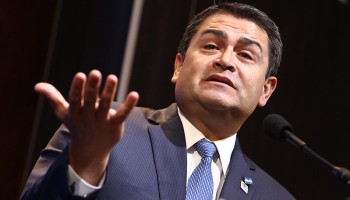Two community leaders have been murdered along with five people under age 18 in Colombia’s Catatumbo region, officials said on Wednesday, as armed groups battle for control of a cocaine corridor on the frontier with Venezuela.
More than 50,000 people have fled their homes since fighting broke out between the National Liberation Army (ELN) and a rival group on January 18. Another 20,000 people are trapped in their towns as battles rage around them, according to a bulletin from the the department of Norte de Santander.
The government of the department — which encompasses Colombia’s section of the Catatumbo region that straddles the border with Venezuela — added that police and army helicopters have flown into the conflict zone and rescued 709 people.
Venezuelan Defense Minister Vladimir Padrino recently announced that his military had joined forces with Colombia to fight the ELN in the Catatumbo region on his side of the border.
"We have launched Operation Catatumbo Lightning to prevent armed groups from entering Venezuelan territory, regardless of their name," he said at a January 31 press conference.
His comments struck some analysts as surprising since Venezuela has long provided shelter for the ELN.
"Venezuela is not just a safe haven — it has much deeper ties," said María Victoria Llorente, who heads a Colombian civil society group called Fundación Ideas para la Paz
"The ELN has Venezuelan fighters recruited into its ranks. In many ways, this is now a bi-national guerrilla force,” she said.
The Venezuelan government did not respond to a request for comment on its alleged relationship to the ELN.
The ELN presence in Venezuela has been well documented by researchers and authorities, as well as in Colombian intelligence reports obtained by OCCRP that are part of a leak of emails from the General Command of the Military Forces.
A 2019 U.S. State Department report said about 1,400 ELN fighters were stationed in 36 camps in Venezuela.
A 2021 Colombian military intelligence report found in the leak cited similar numbers, and noted that more than half the ELN leadership — 13 top ranking rebels — were based in Venezuela. Only six leaders of the group’s more than 5,000 fighters were based in Colombia, while another four were in Cuba, according to the report.
The ELN is the ruling authority in some Venezuelan communities, but the armed group’s connections go much higher, Colombian authorities say. A 2020 military intelligence report alleges that the ELN was shipping drugs with the "collaboration of high-ranking Venezuelan officials."
Colombian officials did not respond to a request for comment.
The ELN’s interests in Venezuela also extend beyond drug dealing and into the political realm, according to a leaked 2022 presentation by the Colombian military to their U.S. counterparts. The military accused the ELN of “facilitating the expansion of the Bolivarian Revolution,” the leftist political and military doctrine that underpins the Venezuelan regime.
The ELN itself started decades ago as a leftist revolutionary group fighting the Colombian government, but it has since become a powerful cocaine trafficking organization.
Cocaine is at the root of the fighting over the past month in Catatumbo, which pitted the ELN against the remnants of another group that began as a leftist insurgency and evolved into a trafficking group: the Revolutionary Armed Forces of Colombia, or FARC.
After the FARC signed a peace agreement in 2016 with the Colombian government, it abandoned some of its cocaine-producing strongholds.
“The ELN was well-positioned to capitalize in many of these areas and nowhere more so than Catatumbo,” Insight Crime, a Washington D.C.-based research group, said in a 2022 report
But one faction of the FARC split from the peace process and continued to operate in Catatumbo, which has led to sporadic fighting with the ELN since 2016, the report said.
The current conflict has resulted in “the largest mass displacement recorded in the last 28 years” in the area, according to the United Nations.






